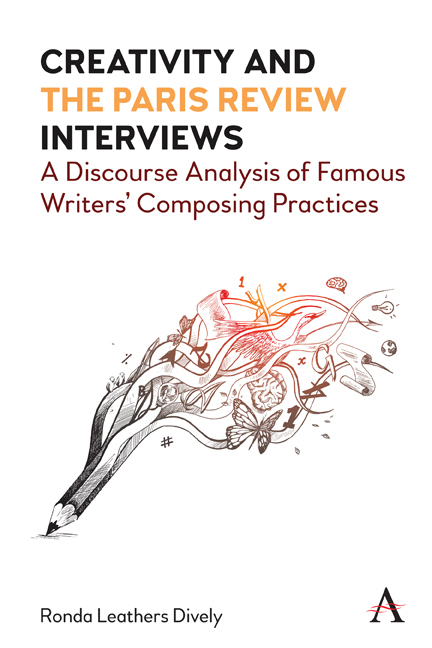 Creativity and 'the Paris Review' Interviews
Creativity and 'the Paris Review' Interviews Book contents
- Frontmatter
- Contents
- List of Illustrations
- Preface
- Acknowledgments
- 1 Impetus, Contexts and Methods
- 2 Composition through the Lens of Creativity Theory
- 3 First Insight, or the Glimmer of Possibility
- 4 Preparation, or Research Broadly Conceived
- 5 Incubation, or Breaks from Conscious Attention
- 6 Insight, or the Eureka Experience
- 7 Verification, or Evaluation
- 8 Emergent Patterns
- 9 Implications for Writing Instruction
- Appendix A Coding Table
- Appendix B List of Cited Paris Review Interviewees
- Appendix C Diagram of Analytical Categories, Subcategories and Themes
- References
- Index
5 - Incubation, or Breaks from Conscious Attention
Published online by Cambridge University Press: 27 April 2022
- Frontmatter
- Contents
- List of Illustrations
- Preface
- Acknowledgments
- 1 Impetus, Contexts and Methods
- 2 Composition through the Lens of Creativity Theory
- 3 First Insight, or the Glimmer of Possibility
- 4 Preparation, or Research Broadly Conceived
- 5 Incubation, or Breaks from Conscious Attention
- 6 Insight, or the Eureka Experience
- 7 Verification, or Evaluation
- 8 Emergent Patterns
- 9 Implications for Writing Instruction
- Appendix A Coding Table
- Appendix B List of Cited Paris Review Interviewees
- Appendix C Diagram of Analytical Categories, Subcategories and Themes
- References
- Index
Summary
As the previous chapter establishes, the second element in the paradigmatic creative process model, preparation, may consume weeks, months or years and may involve diverse modes of inquiry. In some cases, preparation on the heels of a promising first insight immediately yields more substantial insights that advance a project. In other cases, the well-prepared mind becomes saturated, having reached a point where additional research holds little promise, and yet still it cannot conceive a productive pathway forward, cannot grasp how the accumulated knowledge should be combined or reenvisioned in the quest for a solution to the creative problem. Of course, given its recursive nature, creative activity may be arrested at any moment, and history portends that scientific and artistic endeavors of any consequence rarely proceed in seamless fashion, free of obstructions that threaten to undermine them. It is in these disheartening moments of stagnation that the value of incubation—the third element listed in the creative process model and the subject of this chapter—can be fully appreciated.
In practical terms, incubation (not to be confused with procrastination) is defined as the interval of time between the onset of a break from deliberate work on a creative problem and the achievement of insight (the fourth element of the creative process model). Given that incubation occurs entirely within the mind and is, therefore, difficult to study directly, researchers typically infer its nature and usefulness from behaviors and happenings surrounding it, either by observing people at work or by listening to or reading accounts of creative accomplishment. Empirical investigations regularly label the most significant of those happenings, the arrival of insight, as an “incubation effect,” thereby positing a direct cause– effect relationship between the two constructs. While the insightstimulating benefits of incubation are widely associated with unique powers of the unconscious, they have also been linked to fringe consciousness (e.g., daydreaming) and to what Robert M. Olton dubs “creative worrying” (i.e., alternating bouts of conscious and unconscious mentation) on grounds that both enable the sort of loose, uninhibited thinking attributed to the unconscious and thus liberate the mind from cognitive fixations that impede original or fresh perspectives.
- Type
- Chapter
- Information
- Creativity and 'the Paris Review' InterviewsA Discourse Analysis of Famous Writers' Composing Practices, pp. 73 - 88Publisher: Anthem PressPrint publication year: 2022


